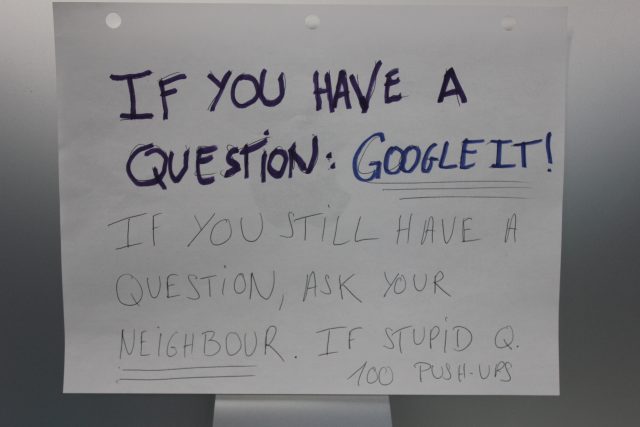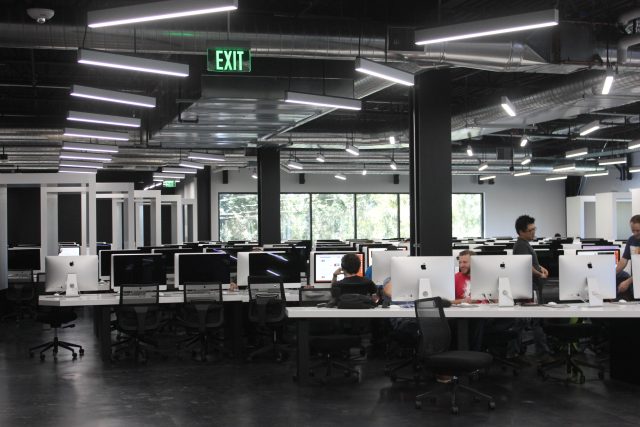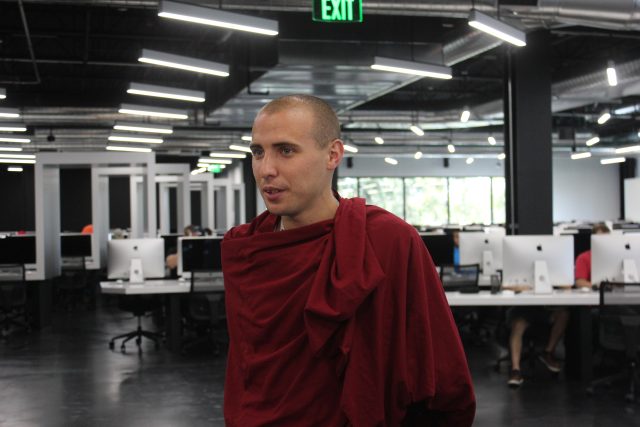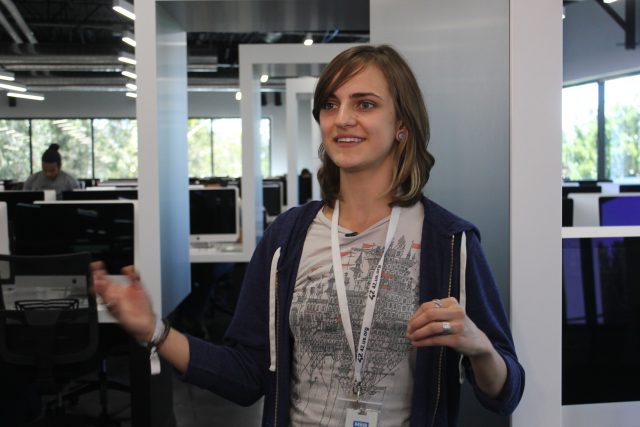Can 42 US, a free coding school run by a French billionaire, actually work?
by Chris Schodt/Edited by Jennifer Hahn.
And yet, here they sit, just 7.6 miles directly across the Dumbarton Bridge from Facebook headquarters in Menlo Park, dreaming of joining Silicon Valley’s legions of programmers. Each day, the students get new programming assignments, but there are no teachers. There is a help desk, or rather a “help” desk—which really, really doesn’t want students to ask for guidance—all in the name of “peer-to-peer learning.”

Cyrus Farivar
Welcome to 42 US, a free (as in beer) coding school, which opened just last month. Even the optional dorms are free. (Good news: laundry is also free! Bad news: you have to pay the dorm $75 a week if you want two meals a day.) Admittedly, it sounds totally crazy.
By comparison, programming boot camps have become big business across the United States. Recent research from Course Report shows that nearly 18,000 students nationwide pay an average annual tuition of more than $11,400, which results in annual revenue of nearly $200 million industry-wide.
But Xavier Niel, the billionaire founder of Free, France’s second-largest ISP, wants none of that.
The first 42—and yes, it’s named after the answer to life, the universe, and everything—opened in Paris in 2013. That location has more charm to it, what with its roof hot tub and wine cellar.
Despite being Silicon Valley-adjacent and down the road from an historic local farm, 42 US is actually in a former DeVry University campus that Niel bought in February 2016 from that for-profit trade school. Driving up to the building feels like going to a boring office park that could be in Anytown, USA. Immediately outside is a largely empty parking lot.
When Ars arrived earlier this month, it wasn’t even obvious at first if we were in the right place. We couldn’t see any “42 US” markings anywhere. The first person we encountered was a DeVry employee, who helpfully walked us over to 42’s section of the building. There, we found a Frenchman seated at a computer in a room that was entirely black. It looked like a small high school theater.
Eventually we were led to Brittany Bir, the school’s chief operating officer. She tried to answer our most fundamental question: why offer a free coding school?
“I do know that what [Niel] has been very interested in doing is to fill this gap that we have with Web developers to get projects to advance so that we can continue to evolve as a society and a community together,” she said.
“If we put up barriers to education with money or with backgrounds, that means there are innovative talents and individuals that are not able to have access to education. So the idea behind 42 is to create an opportunity where individuals from all different kinds of backgrounds, all different kinds of financial backgrounds, can come and have access to this kind of education so that then we can have new kinds of ideas. Because in order to innovate, you need to have new people who think differently.”
For now, the school clearly needs to do much more outreach, particularly to women: when we visited, 81 percent of the students were men.
“We’re only limited by the amount of women that want to apply to the program,” she said. “For us, we’re more than willing to take in more women, but more need to apply.”
Jump in, the water's fine

Cyrus Farivar
“Rather than going to a class with a professor and sitting and listening to lectures, this simulates what you would be doing in real life when you leave 42,” Bir said as she walked us through the space.
The school recruits online and has done well through word of mouth. We saw students from South Korea and Israel, as well as many Americans. Because 42 isn’t a bona fide licensed university, it can’t help with student visas. Students must already have legal status in the US in order to be accepted.
Bir explained how the 18- to 30-year-old students take an online logic test to see if they have the general aptitude and temperament for 42. If they do they are accepted into its “piscine,” the French word for swimming pool, meant to connote the school's “sink or swim” ethos. Students need not provide transcripts, personal essays, or anything else.
The piscine is 42’s month-long crash-course in programming, starting with learning C from scratch. Students spend 12 or more hours per day, six to seven days per week. If they do well, students are invited back to a three- to five-year program with increasing levels of specialty. The school expects many students to drop out, either because they can’t hack it or, ideally, because they get a job. Case in point: the piscine we saw started off with 250 students, but when we visited during the third week, 75 students had dropped out. (The next piscine, which began on August 8, welcomed 500 students, with plans to expand to 2,048 students.)
Bir herself went through the school’s program in Paris. When she started out, she had a degree in Spanish and no programming experience at all. Years ago, Bir left the US to pursue graduate work in Europe, where it would less expensive. She got a master’s degree and taught English at a computer science school before getting connected with 42. While in France, she met her husband, and she was eventually asked to help run 42 US. For now, she and her husband live in the dorms amongst the students.
“It’s kind of a blast from the past,” she said. “It’s reminding me of my days from college.”
A gentle push
Beginner students get lessons in re-coding some of the basic functions in the C library. But how do students know if they’re on the right track?
“In the end they correct each other,” Bir explained. “We have a program which will randomly select five members of our community, who will then be assigned to go correct.”
Students are required to do all work onsite. The school evaluates based on their attendance as well as their ability to grasp the relevant concepts and move forward at 42’s demanding pace.

Enlarge / Lou Guenier is the pedagogical director at 42 US.
Cyrus Farivar
“We make sure they have enough projects to work on,” Lou Guenier, the pedagogical director, told Ars. “During the piscine, if they can finish every exercise of every day, that’s not a good thing.”
He said he’s been impressed by this round of students.
“They have more to lose than in France,” he added. “Because in France, we have free education, free universities. They don’t. Many students gave up two or three jobs just to do the piscine. So they are way more motivated, and I think in America they have the culture where you have to fight for something.”
From one boot camp to the next
One of Guenier’s students and Bir’s dorm-mates is David Lee, a dedicated 24-year-old from Cherry Hill, New Jersey. He came to 42 straight from serving five years in the US Army, most recently as a medic in Qatar. He said that he hasn’t seen anything crazy happening late at night in the dorms.
“Usually most people are coming back, either dead tired or trying to do their laundry,” he said. “It’s very quiet.”
Lee said that he has been learning a lot and would love to join a tech company. But that seems years away for now.
“Before this I had no programming experience, none whatsoever,” he said. “Initially it was really hard. Being able to explain what a type is, finding out how to read a function. Here they basically give you everything you need and [say] watch these videos and go figure it out.”

Enlarge / Hope Czuba, when not programming, is a fire performer.
Cyrus Farivar
“The expectations are too high,” she said. “It’s supposed to simulate a real-life work environment where your employer is asking too much of you, and you have to learn to be balanced in yourself.”
“I see tech as this really beautiful thing that is at the forefront of every revolutionary industry,” she said. “I’m not really sure how I’m going to help the world, but I would like to be able to help a lot of people all at once.”
Listing image by Cyrus Farivar
No comments:
Post a Comment